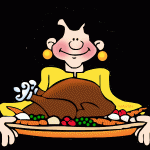 Thanksgiving is my absolute favorite day of the year. The way I do it, it has all the advantages of a holiday with none of the oppressive side-effects. There are no presents, so there is no guilt or financial stress. The food is wonderful and comforting (with lots of leftovers). I can enjoy a jello mold or sweet potatoes with marshmallows without shame. The participants are so ill-assorted that there is no way it could be called a dinner party, so there is little worry about maintaining my cool. Moreover, there is no chance that anyone can mix up the date and ring the doorbell a day early. And somehow family is absorbed into the chaos and the calories in a way that tension is neutralized. The pleasure I feel as I gaze around the table is a far cry from the anxiety family life usually brings. Or used to.
Thanksgiving is my absolute favorite day of the year. The way I do it, it has all the advantages of a holiday with none of the oppressive side-effects. There are no presents, so there is no guilt or financial stress. The food is wonderful and comforting (with lots of leftovers). I can enjoy a jello mold or sweet potatoes with marshmallows without shame. The participants are so ill-assorted that there is no way it could be called a dinner party, so there is little worry about maintaining my cool. Moreover, there is no chance that anyone can mix up the date and ring the doorbell a day early. And somehow family is absorbed into the chaos and the calories in a way that tension is neutralized. The pleasure I feel as I gaze around the table is a far cry from the anxiety family life usually brings. Or used to.
Back when my children were small and I was working long hours, a couple of my colleagues and I founded the Thank God It’s Monday Club. Why, you may wonder did we prefer Monday to the more traditional Friday? Because after a weekend of clumsy parenting, unaccomplished tasks, stressful engagement with my husband and a pervasive sense of exhaustion, guilt and incompetence, it was a relief — a life saver, really — to get back to the office. There it was likely that at least once during the day I would feel that I was good at something, that I could complete something, that I could accomplish something worth doing, and that the people around me valued my presence. Our club was mostly made up of women with nuclear families, but we were often joined by those who had extended families and had spent time with them over the weekend.
Families are messy. Work is neater. It is a blessing to be able to draw on both for satisfaction and affirmation. As the Thank God It’s Monday Club confirmed for me, one often compensates for the other. Our generation is the first that had this option. Women in the first half of the twentieth century were either housebound and economically tied to their husbands, or if they did work outside the home, it was at menial and repetitive jobs for which they were paid very little. The only exception was Rosie the Riveter, who during World War II was recruited into the workforce and drummed out of it again when the men came home.
We fought our way into the interesting jobs, and we got paid enough to feel independent — though not as much as our male counterparts. But the main thing was that we developed skills, expertise, power — and self-confidence. We were persons, not chattel.
It is as self-respective, self-assured persons that we are entering our Second Adulthood, which is why we are able to experience this new stage of life with such glee. In my new book How We Love Now, I make the case for loving our work as a significant component of our emotional lives. To be cherished and incorporated into our reinvented lives going forward.
I can’t imagine my life without work. When mine is going well, the feeling is love-like. I think about it even if I am doing other things; I get excited when I embark on a particularly interesting task; I lose track of time when I am engrossed in it; and when I was deprived of my work (fired), I felt totally bereft. Most of my first-adulthood work put me in a community where I could count on the emotional and intellectual sustenance as well. Now I work on my own, and I miss that. But, like many women our age, I have come to treasure quality more than quantity in my friendships and meaning more than ambition in my work.
Erik Erickson (not Freud) observed that “love and work are the cornerstones of our humanness.” As we move on through life, we can be thankful when we are able to nurture both sources of nourishment.
